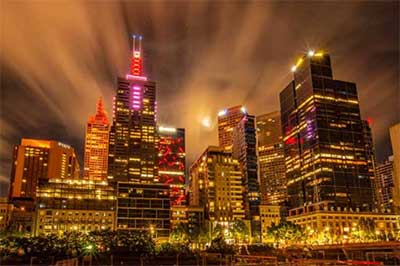Entertainment Lags in Night Time Economy Rebound

The entertainment sector’s role in the post-pandemic reboot of the night time economy (NTE) falls behind food and beverage, according to a new report.
The new “Measuring The Australian Night Time Economy 2020 – 2021” insights from the Council of Capital City Lord Mayors (CCCLM) analysed employment and sales turnover by city.
The Council consists of the Lord Mayors of Adelaide, Brisbane, Darwin, Hobart, Melbourne, Perth and Sydney, and the ACT Chief Minister.
In 2020-21, core NTE trade turnover between 6pm and 6am, increased to $133 billion. But it was still $6.2 billion, in line with 2017/18 levels.
Entertainment was the worst performer, declining to 15% below the 2018/19 pre-pandemic baseline, affected by no dancing and close contact rules.
The drink sub-sector surpassed the baseline, while foodies (which included takeaways) were almost back to pre-pandemic levels.
Following devastating 20% job losses in the first three months of the pandemic to June 2020, employment rebounded by 18% by June 2021 to more than 1.05 million workers.
But it remained 7% below pre-pandemic levels, with 73,000 fewer positions – pushing Core NTE employment back to 2016 levels.
“This report reflects the resilience of this sector,” Basil Zempilas, CCCLM Chair and Lord Mayor of Perth said.
“Whilst there have been negative impacts across employment and business during the financial year, the sector recovered in most areas despite the ongoing lockdowns, lockouts and restrictions that were most severely imposed on this sector.”
Zempilas focussed on one important trend: “Weekend visitations are at pre-pandemic levels, however the mid-week continues to be impacted by less people working in our cities, impacting on both day and night time economies”.
Despite the uncertainty, in the 2020/21 financial year a record new 9,590 Core NTE businesses began, bringing the national total to 123,300.
“Potential reasons for this include strong consumer demand as restrictions lifted and entrepreneurs acting in response to government stimulus packages,” the report suggested.
Of 2,395 new entertainment establishments, 1,054 were in creative and performing arts, 955 in sports and recreation, and 62 in brothels.
Of the 6,796 new foodies (up 10%), the majority of 6,147 (or 14%) were cafes and restaurants,
Drink establishments rose at a slower 5% rate (to 399), continuing an existing trend of a “shift away from (alcoholic) drinks” towards a more diverse range of night time activities.
The most amount of new businesses were in NSW, up 11%, and Victoria, up 9%.
Entertainment is 17.6% of Sydney’s NTE, compared to food (70.5%) and drink (11.9%).
“Employment in all of Sydney’s entertainment industries had returned to pre-pandemic levels by June 2021 but sales turnover remained lower than in 2018/19 across most industries.”
Sydney gained 49 new entertainment businesses, the most in sports and recreation.
Between June 2020 and June 2021, Melbourne gained 51 new entertainment businesses.
33 of these were from creative and performing arts activities, the majority (54%) of the city’s NTE’s entertainment sector. Six clubs closed.
By June 2021, more people had jobs in this sector than in June 2019. Sales turnover declined to $360 million in 2020/21 from $518 million in 2018/19.
Most NTE growth occurred in greater Melbourne, outside the capital, and with the food sector showing the greatest rise of 10%.
Brisbane’s biggest NTE expansion was in entertainment and food, up 8.5% and 6.8%.
It gained 150 new entertainment businesses between June 2020 and June 2021, 91 in creative and performing arts which are 46% of Brisbane’s entertainment establishments.
Employment and sales turnover remained below the pre-pandemic baseline.
Perth NTE proved strong with employment rebounding to 2018 /19 levels, sales turnover surpassing pre-pandemic levels, and 14 new businesses beginning to trade.
However, its entertainment sector was below 2018/9 levels in jobs and economic movement, making up only 13% of NTE businesses.
Just over half of Adelaide’s entertainment segment is creative and performing arts, which make up 40% of jobs and 31% of its turnover.
Entertainment only makes up a small segment of the city’s Core NTE, with food at a high 71% (63% nationally) and drink at 15% compared to 7% nationally.
Hobart’s rise by 15 new NTE businesses to 141 was a boon for creative and performing arts, which make up 57% of its entertainment sector.
But jobs rising by 140 to 13% higher than 2018-19 levels was due to strong growth in food and drink, but sales turnover of $41 million was still 4% below 2018-19.
Similarly, Canberra’s 2.9% rise in sales turnover was attributed to food (69% of the sector) and drink.
But the nation’s capital was the only area to have surpassed pre-pandemic performance in employment, up 8.5% on 2018-19.
The slow burn in entertainment’s recovery is blamed on Darwin NTE’s decline in employment by 16% and turnover by 6.5%.
But the NTE is important to the city’s economy, representing 6% of total businesses. Darwin gained 20 Core NTE establishments to a total of 438, with creative and performance arts representing only 4% of this growth.






























